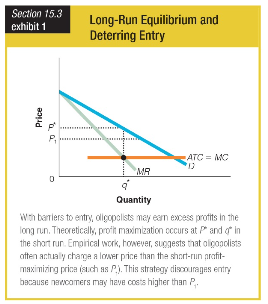An oligopolist charges a lower price than the short-run profit-maximizing price. How does this affect the firm’s allocative efficiency?

a. The firm achieves allocative efficiency because P 1 exceeds MC.
b. The firm fails at allocative efficiency because P 1 is less than the minimum ATC.
c. The firm fails at allocative efficiency because P 1 exceeds MC.
d. The firm achieves allocative efficiency because P 1 is less than MC.
c. The firm fails at allocative efficiency because P 1 exceeds MC.
Economics
You might also like to view...
Before entering, fixed cost associated with the industry in question are sunk costs for
A) the incumbent firm. B) the outside firm. C) both firms. D) neither firm.
Economics
Give a complete and concise definition of each of the following terms
a. deliberately erected entry barriers b. inefficiency of monopoly c. price discrimination d. profit-maximizing equilibrium for a monopolist
Economics